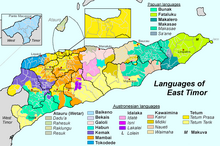Tetun language
The tetun (in Portuguese, tetum ) is, along with Portuguese, the official language of East Timor. It is an Austronesian language with many words of Portuguese and Malay origin.
Tetun developed as a contact language during the 16th century, after the Portuguese colonization. The main dialect, spoken in the country's capital, Dili, is called tetun-prasa, and the more traditional form, spoken in other parts of the country, is called tetun-terik.
Although Portuguese was the official language of the former Portuguese Timor, Tetun-Prasa served as the lingua franca, thus taking vocabulary from Portuguese. When Indonesia invaded and occupied East Timor in 1975, declaring it the "27th province of the Republic", the use of Portuguese was prohibited. The Catholic Church, instead of adopting Bahasa Indonesia as its liturgical language, adopted Tetun, making it a benchmark for East Timor's cultural and national identity.
Vocabulary
The Tetun name for East Timor is Timor Lorosae, or 'country of the rising sun,' which is the official name of the country.
- parrot - sun
- loron - day
- lorosae - born of the Sun (from the Sun this)
Some words in Tetun:
- Barak - a lot.
- bo'ot - Big
- ki'ik - Little
- mane - man
- fetu - woman
- foho - Mountain
- Tasi - sea
- Malae - foreign
- liafuan - word
- rai - country
Some words derived from Portuguese in Tetun:
- learn - learn
- demais - too much. (also 'barakliu')
- entaun - then.
- Eskola - School
- Igreja - church
- istoria - history
- paun - bread
- povu - people
- relijiaun - religion
- serveja - beer
- tenki - have to
Some words derived from Malay in Tetun:
- Barak - a lot. (Banyak)
- Bele - power, highly respected person (Boleh)
- Uma - house (rumah)
- dalan - Street (jalan)
- karreta - car (kereta)
- lima - Five (limah)
Malay cardinals are frequently used in the Tetun language.
Grammar
Tetun grammar is comparatively easy, as there are no genders, no verb conjugations, and no definite article. Therefore fetu can be translated as 'woman' or 'the woman'. In the same way, the plural is not usually used for nouns, although it is possible to use the word sira ('they') for emphasis:
- Fetus - [woman]
- Fetus sira - [women]
In the case of words of Portuguese origin, the plural is used, using the suffix:
- Estadus Unidus - United States (also) Estadu Naklibur sira)
- Nasoens United - United Nations (also) Nasaun Naklibur sira)
There are no verbs like 'ser' nor 'estar', but the word la'ós (literally 'is not') can be used to indicate the negative.
- Timor oan la'ós Indonézia oan. The Timorese are not Indonesian.
- Lia indonézia la'ós sira nia lian. The Indonesian is not his tongue.
Similarly, maka (which roughly translates to 'that is', that is, a relative)
- Xanana Gusmão maka ita nia Prezidente. Xanana Gusmão is our President.
- João se maka gosta serveja. It's Juan who likes beer.
The past participle is not usually used except for emphasis, when the word ona ('ya') is added to the end of the sentence.
- Ha'u han. - (I) As
- Ha'u have etu. - Like, I ate rice.
- Ha'u have etu ona. - I ate / I ate rice.
Like Malay, Tetun uses two forms of 'we': ami (equivalent to 'kami' in Malay) which is exclusive, and ita (equivalent to 'kita' in Malay), which is inclusive.
- Ita nia rai - Our country (My country and yours)
- Ami nia karreta - Our car (The car of our family, not yours).
Cardinals
- Ida - One
- Rua - Two
- Tolu - Three
- Haat - Four
- Lima - Five
- Neen - Six
- Hitu - Seven
- Ualu - Eight
- Sia - Nine
- Sanulu - Ten
Spelling
As Tetun did not receive any official recognition or promotion from Portugal or Indonesia, it has not been until relatively recently that the National Institute of Linguistics (INL) has established a standard spelling.
This was based on spelling reforms introduced by Fretilin in 1974, when it launched literacy campaigns throughout East Timor that year, and also in the Catholic Church, when it adopted Tetun as its liturgical language during the Indonesian occupation.
These reforms included the simplification of words of Portuguese origin. For example, educação (education) was transliterated as edukasaun. Other more recent INL reforms include the transliteration of the spellings 'lh' and 'nh' from Portuguese as 'll' e 'ñ', as well as Galician in Spain.
Consequently, senhor in Portuguese becomes sir in Tetun, and trabalhador (worker) becomes worker. Some linguists favored 'ly' and 'ny', but others considered these spellings too close to Indonesian, even if 'ny' It is used in Catalan, which is very close to Portuguese. The letter 'ñ' was also used in Filipino, but was replaced by 'ny'.
The letter combination 'ch' is transliterated as 'x'. For example cha in Portuguese, is written as xá. This use of the letter 'x', of Galician origin, is also found in the Konkani language in Goa.
Phrases
- Bon dia - Good morning
- Diak ka lae? - How are you? (literally: Well or not?)
- Ha'u diak - I'm fine.
- Obrigadu - Thank you.
- Ita bele koalia Tetun? - Can you talk tetum?
- Loos - Yes.
- Lae - No.
- Ha'u komprende - I understand.
Contenido relacionado
Caribbean languages
Languages of Israel
Classical arabic

